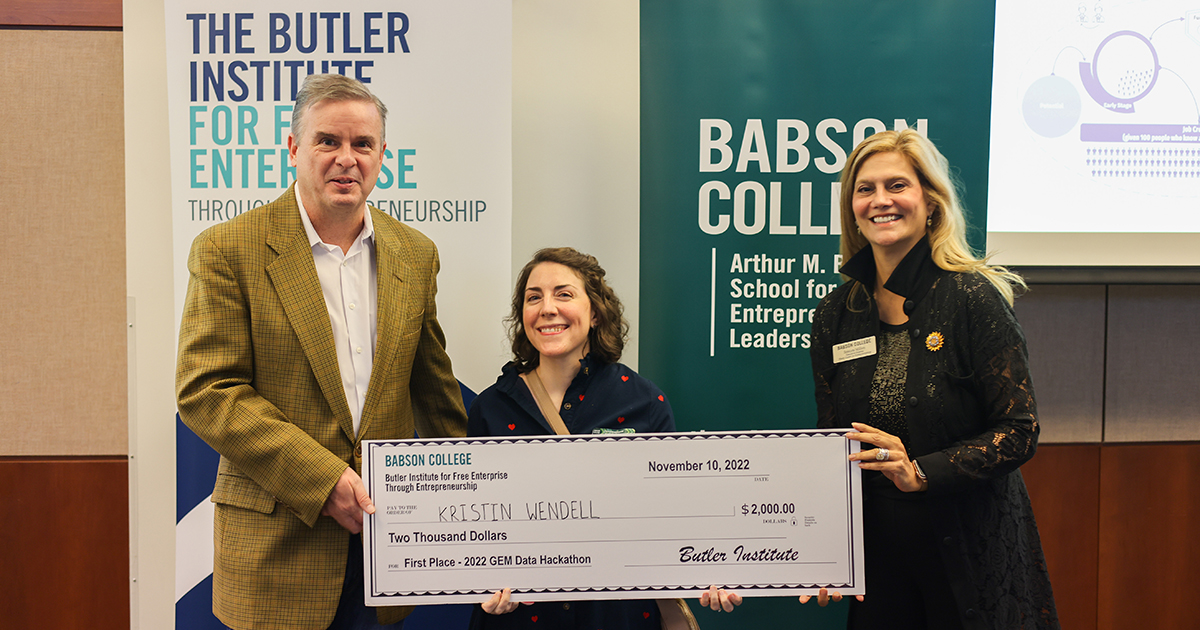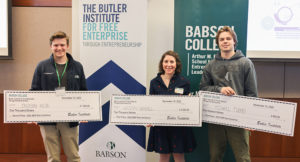Students Polish GEM Findings into Winning Data Hackathon Competition

It might not be as contagious as the common cold, but Kristin Wendell ’07, MSBA’23 found that people can “catch” the entrepreneurship bug and therefore increase job creation simply by being around other entrepreneurs.
Wendell, whose contagious entrepreneurship analysis won first place November 10 at Babson College’s second annual GEM Data Hackathon, said she was inspired by a Wall Street Journal article that found that healthy living and exercise was as contagious among people living together as any virus.
“I was curious if entrepreneurship could also be ‘contagious,’ and if so, how did that relate to job creation? I found an impactful association between personally knowing an early-stage entrepreneur and every aspect of the job-creation cycle,” Wendell said. “Those connected to the early-stage entrepreneurial network are more likely to be entrepreneurs themselves, they generate more jobs and fund other entrepreneurs more frequently at a greater rate.”
Wendell’s analysis was one of many at the hackathon, a competition where Babson graduate and undergraduate students are encouraged to analyze data collected in the 2021–2022 U.S. Global Entrepreneurship Monitor (GEM) report and unearth new facts.
The event, which came right before Babson’s Rocket Pitch event, helped kick off the College’s annual Global Entrepreneurial Leadership Week.
Wendell’s first-place win included a $2,000 prize, while second-place winner Jackson Kuja ’25 won $1,000, and third-place winner Michael Twomey ’23 won $500. The theme of this year’s competition was job creation.
“We chose that topic because we’ve been dealing with the great resignation and the fact that the hiring market can be so tough for an entrepreneur,” said Andrew Corbett, Paul T. Babson Distinguished Professor of Entrepreneurial Studies
Fresh Eyes and New Insights
The GEM Data Hackathon is an initiative launched last year by the Butler Institute for Free Enterprise Through Entrepreneurship under the leadership of Corbett and Smaiyra Million P’21, executive director at The Arthur M. Blank Center for Entrepreneurship, and Professor Mahdi Majbouri, associate professor of economics and faculty director for the MSBA program.
“Those of us that work with the GEM data each year will see similar aspects and every once in a while, we’ll see something really insightful,” said Corbett, the faculty director at the Butler Institute. “This event gives our students an opportunity to look at the data with fresh eyes and find new insights, and it gives them a chance to stoke their interest in data analytics and research.”
Students used the most recent 2021/2022 U.S. GEM report, released in September, as well as previous reports going back several decades. This year’s GEM report surveyed more than 2,000 American adults about events over the last year, including shifts in the economy, the impact of the ongoing pandemic, and overall enthusiasm about entrepreneurship.
The U.S. report is one of many created by the Global Entrepreneurship Monitor, co-founded by Babson College in 1999 as a global consortium of academic researchers who study entrepreneurial motivation and activity around the world.
“We were really looking for ways where the data collected could impact practitioners and policy, because that’s the whole idea of the Butler Institute—to find ways that entrepreneurs can positively affect business policy and to research policies that affect entrepreneurs,” Corbett said.
This year, the committee received 10 submissions and selected the top three based on the insightfulness and novelty of the analysis as well as the visual representation of the GEM data. Submissions were judged by Babson faculty in a blind competition to avoid bias. Judges included Corbett, Million, Majbouri, Candida Brush, Richard Cleary, Donna Kelley, Dessislava Pachamanova, and Jeffrey P. Shay ’87, MBA’91.

Growing Jobs, Growing Interest
Surprised winners of this year’s competition happily found out during the award ceremony, which attracted dozens of students and faculty.
“I am pretty sure I forgot to smile in the group picture of all three winners. I was just over the moon shocked and excited,” Wendell said. “My success is very much a testament to the MSBA program. I can directly tie tools I used to analyze and build my visualization to four different core classes—just for this one hackathon!”
Kuja, who placed second, used the GEM data to create what he called an “employment funnel,” showing that one in 10 current entrepreneurs would be hiring and creating jobs over the next five years. Twomey, who took third place, analyzed entrepreneurial job creators against those projecting zero or negative job growth and found that the job creators started in low-competition areas and kept their focus on global growth low.
The number of students who entered the competition, as well as student interest has grown, said Corbett, who plans to continue the event next year.
“It’s another opportunity for the Babson community to rally around this data and the findings. And, in this case, it’s an integration of our great analytic students and the MSBA program,” Corbett said. “We’ve got undergrads that are in the Butler Institute that are looking at GEM and looking at the data around entrepreneurship policy, so this brings all those folks together and gives them a chance to get an idea of what we do as researchers, and also lets the students talk about what they did as nascent researchers.”




